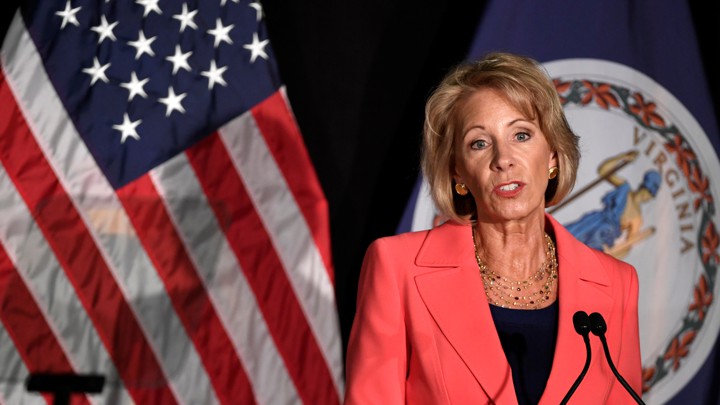The Education Department’s Office for Civil Rights has expanded Title IX’s reach far beyond its original purpose. At least, that’s how R. Shep Melnick sees it.
In his latest book, The Transformation of Title IX (Brookings Institution Press), Melnick, a professor of American politics at Boston College, argues that civil-rights officials — with the help of activists and federal judges — have wielded the gender-equity law to try to upend gender stereotypes, define sexual harassment in an overly broad way, and force institutions to adopt a particular view of gender identity.
The federal government has issued regulations under Title IX only once, in 1975. Doing so requires going through a public-comment process and multiple stages of revision. Officials have instead opted to put out guidance documents that, as they tell it, simply clarify existing law and regulation, Melnick says.
Yet the guidance has imposed heaps of new restrictions on colleges, he says: “They’re making up completely new rules.” And administrators heeded the government’s demands, he says, because colleges’ federal funding was on the line.
Melnick spends much of the book criticizing how Title IX has been applied to sexual misconduct and athletics. He also singles out the Obama administration’s guidance on transgender students, which required schools and colleges to allow students to use the sex-segregated facilities, like bathrooms and locker rooms, that corresponded with their gender identity. (The Trump administration has withdrawn that guidance.)
“This is a level of silliness that is not appropriate for a problem that is this serious.”
Trump’s Education Department just wrapped up a public-comment period on its newly proposed Title IX regulations, which include promising changes, Melnick says. Yet he thinks the compliance organizations that have sprung up around Title IX on campuses are here to stay, regardless of what the final rules look like.
Melnick spoke with The Chronicle about why the government’s approach to Title IX enforcement needs to change, masculinity, and the shortcomings of prevention training.
Are you suggesting that Title IX has outlived its usefulness in the context of higher education?
Absolutely not. There are still instances where there is discrimination against women. There might be some instances where there is discrimination against men. I see no reason to think that we should change our position on the basics of the statute. The real question is whether the way it was interpreted on sexual harassment and gender issues, and to some extent on athletics, went so far beyond the intent and the clear statement in the law that some of those regulations need to be changed.
So you’re criticizing how Title IX has evolved. At the same time, this is a law primarily about women and education. That has a lot of societal and cultural undertones that have shifted over time. Sexual harassment wasn’t even a common term in the 1970s. How can the law not evolve?
When it comes to the original purpose of stopping discrimination and access to programs, that was crucial. That was effective. When it came to reducing discrimination in employment for women, which we forget was really horrible as late as the late 1960s and early 1970s — that was very important. I also agree with the emphasis upon providing more athletic opportunities for girls and women in sports.
There’s no doubt in my mind that sexual harassment can be an impediment to women’s education. The big question is, how do we define it? How granular does the federal government try to get in defining what it is? And what are the protections that we use when we have disciplinary and investigatory exercises? It really comes down much more to the extent and detail and purpose of the regulation, rather than whether Title IX covers these important matters.
You told NBC News last month, “A lot of the things we put in place to say, ‘We really have to help women feel more comfortable and more secure’ — the rationale for some of those things has disappeared.” Can you explain that?
When Title IX was created, in 1972, the proportion of women in higher education was much different than it is today. Undergraduates were a little over 40 percent women in the 1960s and early 1970s, and 60 percent men. Now those numbers are flipped. The enrollment in medical schools now is more than 50 percent female.
I graduated from college in 1973, and I find the impediments to women at that time shocking. But that has changed dramatically. We need to take account of that. One problem we’re facing right now is that men are really falling behind. I don’t think that’s the fault of educational institutions, but the nature of the problem certainly has changed.
The fact that men are falling behind in educational attainment — is that something you’d like to see the Office for Civil Rights addressing?
I’m hesitant to say that is something they should take on. If there are instances where there are important opportunities that are made available to women and not to men, then that bears investigation. I’m not willing to say, as some people have, that anything that is female-only is contrary to Title IX. If we have programs that encourage more women to do coding, to be involved in science, technology, engineering, and math, universities should have the discretion to do that.
I’d like to see programs that encourage men to go into fields that are almost entirely female, like psychology, social work, elementary- and secondary-school teaching. This is an area where universities and schools need to pay attention. I’d rather not have people at the Education Department telling them how to do it.
So how would that kind of a system be regulated?
I can’t come up with an exact formula. The problems facing male students, like the ones that face female students now, are pretty subtle. It’s not so much discrimination by institutions that’s holding them back. It’s cultural forces. It’s the fact that boys mature later. A variety of things that are not very susceptible to regulation.
If it’s not government agencies running the show, who makes the rules?
The first line of responsibility lies with the universities themselves. They’ve really got to buy into the rules that they establish, because they are the ones that are going to be enforcing them. On sexual-harassment matters, the role that the federal courts have played has been relatively thoughtful. They were the first to say that sexual harassment is a form of sex discrimination, and they established pretty reasonable liability rules to deal with the problem. That was true in the employment context as well.
Where I start to be critical of the Office for Civil Rights is the way in which they simply broke ranks with the courts and took a much more directive approach. I have very few good things to say about the Trump administration. But in this area, they are trying to put federal regulations in line with court decisions so that we will have a clearer set of rules and avoid some of the excesses of the Obama era.
You take issue with the prevention training that federal regulations now require colleges to do.
We don’t have a very good idea of what happens in these trainings because a lot of schools just don’t explain what their training is. There’s some evidence that the training is not about rules of proper behavior, but is an attack on understandings of masculinity that goes well beyond what would be necessary to explain to people what behavior is appropriate and what is not. What I’d like to see is more transparency about what is being taught, rather than giving a blank check to people within Title IX offices to basically take over some of the teaching role of universities.
I imagine you went through Title IX training. What was your experience like?
I went through two training sessions online. Some of the stuff was probably worth mentioning but should be obvious. But also, it really exaggerated what the law prohibits, often in very silly ways. Part of the training was: Here are eight things in a professor’s office that are discriminatory, name them. It was kind of like “Where’s Waldo?” One of them was a picture of your wife in a bathing suit. Another was an antiwar poster, because that discriminates against veterans. This is a level of silliness that is not appropriate for a problem that is this serious.
Do you think the idea of women being mistreated on campuses is overblown?
Do I think that female students on campus very often have to put up with annoying statements, subtle put-downs, and other offensive things? Yeah, I’m sure they do. Do I think there is a rape culture in which sexual assault is rampant on college campuses? I just don’t buy that. There are a lot of problems on college campuses that make sexual assault much too prevalent, most importantly excessive drinking. No. 2, a sports culture. I’d like to change all of those things. But it’s important to make the distinction between the more subtle problems that women face on a daily basis and this claim that sexual assault is rampant.
This interview has been edited for length and clarity.
Sarah Brown writes about a range of higher-education topics, including sexual assault, race on campus, and Greek life. Follow her on Twitter @Brown_e_Points, or email her at sarah.brown@chronicle.com.
This article is part of:



